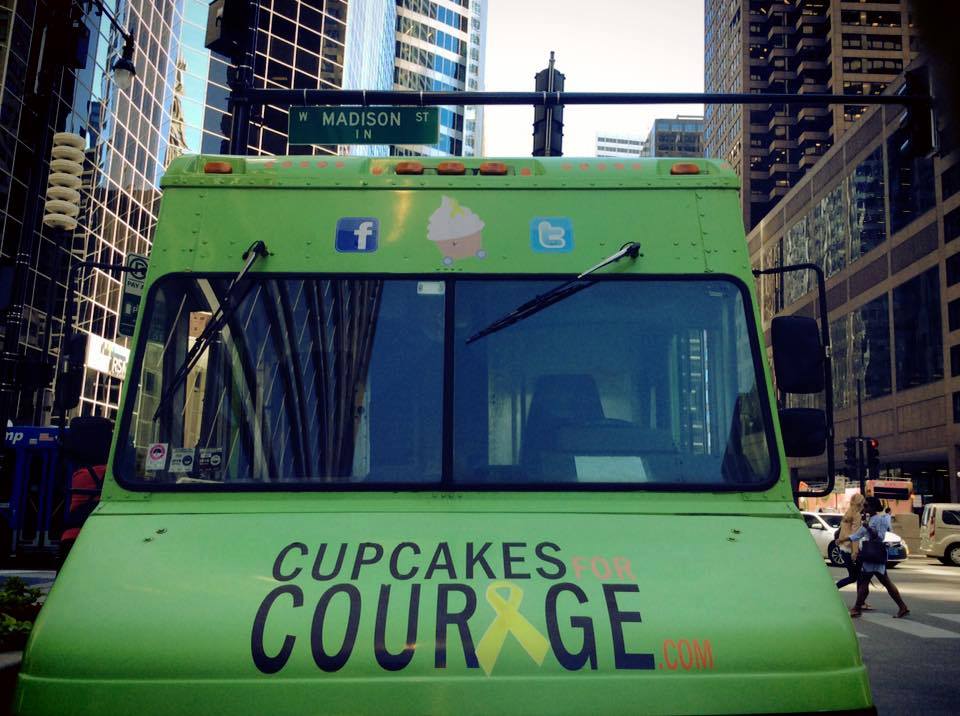By Greg Trotter
Chicago Tribune
WWR Article Summary (tl;dr) Chicago is the only one of the 10 largest cities in the U.S. to have a proximity requirement for food trucks. Under city regulations, mobile food vendors cannot park within 200 feet of a restaurant’s primary entrance. One cupcake vendor is challenging that rule, all the way to the Illinois Supreme Court.
Chicago
A cupcake food truck owner who believes Chicago’s regulations — including a rule requiring mobile vendors stay at least 200 feet away from bricks-and-mortar restaurants — are unconstitutional is asking the Illinois Supreme Court to take up her lawsuit.
If the state Supreme Court obliges, it will be the next step in a lengthy legal battle that began after Chicago announced new food truck regulations in 2012. Laura Pekarik, owner of the Cupcakes for Courage food truck business, filed a petition to the state Supreme Court late last week after the appellate court ruled in the city’s favor in December.
“What is just is just. … As long as (my attorneys) keep fighting for me, I’ll hold my position,” Pekarik said Wednesday.
Though Pekarik’s business is the sole plaintiff in the lawsuit, she has the support of many food truck operators in Chicago and across the U.S. City officials, meanwhile, say they’ve struck a balance that works for food trucks, restaurants and consumers.
Under city regulations, mobile food vendors cannot park within 200 feet of a restaurant’s primary entrance. Chicago is the only one of the 10 largest cities in the U.S. to have a proximity requirement for food trucks, according to the National Food Truck Association.
The restriction makes it all but impossible for food trucks to serve the lunch crowd in the North Loop, said Robert Frommer, Pekarik’s attorney. Chicago food trucks can only legally park and operate on 3 percent of the curbs in the North Loop business district, according to an analysis by the libertarian law firm Institute for Justice, based in Arlington, Va.
“We’re going to keep on fighting because everyone has the right to choose where they get their lunch,” said Frommer, senior attorney with the Institute for Justice.
The city has three weeks from Monday to file an answer with the Illinois Supreme Court, if it chooses to do so, Frommer said. The court will then decide whether to take up the lawsuit.
The city’s Law Department is still evaluating the case, said Bill McCaffrey, a spokesman for Mayor Rahm Emanuel.
Also at issue in the lawsuit is a city regulation requiring food trucks to have city-monitored GPS tracking devices. In December, the Illinois Appellate Court upheld the Cook County Circuit Court’s ruling that both the 200-foot rule and the GPS rule were constitutional.
“These regulations have already withstood the scrutiny of the courts, but more importantly, they have been embraced by the many entrepreneurs, and the public at large, who continue to serve and enjoy a wide variety of offerings every day across the city,” said Rosa Escareno, commissioner of Chicago’s Department of Business Affairs and Consumer Protection, in a statement.
In 2012, there were 115 licensed food trucks in Chicago, according to the city. That number dipped down to 89 in 2014 — the lowest number since the new rules went into effect. As of Wednesday, there were 110, according to city figures.
Pekarik, 32, said she first started baking earnest in 2010 after her older sister Kathryn Chandler was diagnosed with non-Hodgkin lymphoma. Baking was a fun and calming diversion, she said. In 2011, Pekarik left her business studies at Elmhurst College to start her Cupcakes for Courage business.
Today, Pekarik’s two bricks-and-mortar bakeries, Courageous Bakery & Cafe in Elmhurst and Oak Park, represent about 80 percent of her annual revenue. Though still licensed in Chicago, Pekarik mostly operates her two food trucks in the suburbs now. Rarely does she venture into the city anymore, save for the occasional festival or special event.
But that would change if Chicago’s regulations on food trucks are eventually loosened up.
“The moment it’s lifted, I would be the first one out there,” Pekarik said.














































































































































































































































































































































































